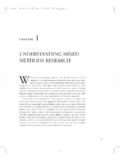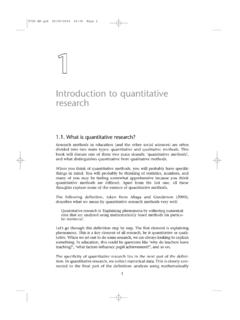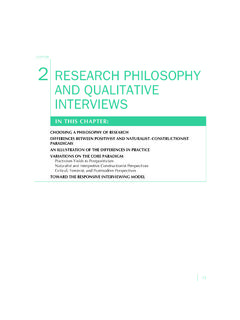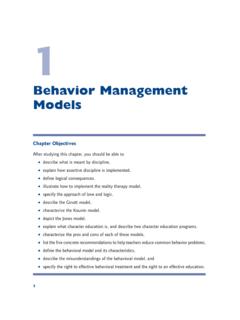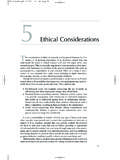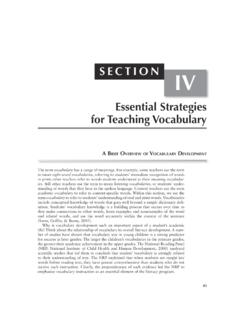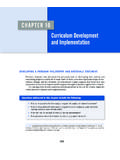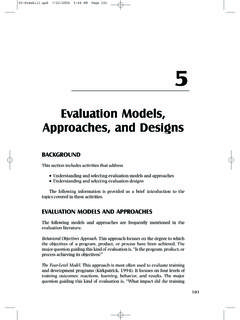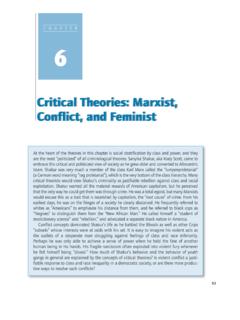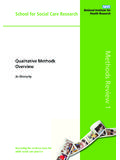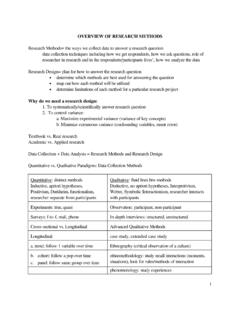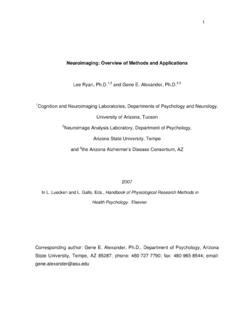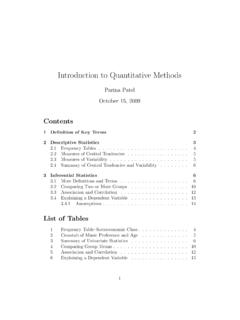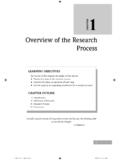Transcription of 2 OVERVIEW OF QUALITATIVE RESEARCH - SAGE Publications
1 2 Learning OutcomesBy the end of this chapter, you will be able to: xUnderstand the purpose of QUALITATIVE RESEARCH xAppreciate the benefits of QUALITATIVE RESEARCH xRecognize what counts as RESEARCH and what does not xDistinguish between quantitative and QUALITATIVE RESEARCH xDecide whether or not to use triangulation xSee how QUALITATIVE RESEARCH can contribute to the rigour and relevance of WHY DO QUALITATIVE RESEARCH ? QUALITATIVE RESEARCH methods are designed to help researchers understand people and what they say and do. They are designed to help researchers understand the social and cultural contexts within which people live.
2 One of the key benefits of QUALITATIVE RESEARCH is that it allows a researcher to see and understand the context within which decisions and actions take place. It is often the case that human decisions and actions can only be understood in context it is the context that helps to explain why someone acted as they did. And this context (or multiple contexts) is best understood by talking to researchers contend that it is virtually impossible to understand why some-one did something or why something happened in an organization without talking to people about it. Imagine if the police tried to solve a serious crime without being able to talk to the suspects or witnesses.
3 If the police were restricted to using only quantitative data, almost no crimes would be solved. Imagine if lawyers and judges were not allowed to question or cross-examine witnesses in court. The validity and reliability of any court decision would be thrown into serious doubt. So, likewise, QUALITATIVE researchers argue that if you want to understand people s motivations, their reasons, their actions, and the context for their beliefs and actions in an in-depth way, QUALITATIVE RESEARCH is best. OVERVIEW OF QUALITATIVE 51/25/2013 2:10:42 PM6 QUALITATIVE RESEARCH in Business and ManagementKaplan and Maxwell (1994) say that the goal of understanding a phenomenon from the point of view of the participants and its particular social and institutional context is largely lost when textual data are of the primary motivations for doing QUALITATIVE , as opposed to quantitative, RESEARCH comes from the observation that, if there is one thing which distinguishes humans from the natural world, it is their ability to talk.
4 It is only by talking to people, or reading what they have written, that we can find out what they are thinking, and understanding their thoughts goes a long way towards explaining their OF QUESTIONS USING QUALITATIVE RESEARCHThe questions that a QUALITATIVE researcher might typically ask are what, why, how, and when questions: xWhat is happening here? xWhy is it happening? xHow has it come to happen this way? xWhen did it happen? WHAT IS RESEARCH ?In a university setting, RESEARCH is defined as an original investigation undertaken in order to contribute to knowledge and understanding in a particular field.
5 RESEARCH is a creative activity leading to the production of new knowledge. The knowledge produced is new in the sense that the facts, the interpretation of those facts, or the theories used to explain them might not have been used in a particular way before in that specific discipline. RESEARCH typically involves enquiry of an empirical or conceptual nature and is con-ducted by people with specialist knowledge about the subject matter, theories, and methods in a specific field. RESEARCH may involve contributing to the intellectual infra-structure of a subject or discipline ( by publishing a dictionary).
6 In some fields, such as engineering, computer science, or information systems, RESEARCH can also include the experimental design of new artefacts. Engineers often try to develop new or substantially improved materials, devices, products, or course, as more RESEARCH is published, the subject matter, theories and methods used in a particular field may change over time. For this reason, scholars in many disci-plines will write a literature review of previous relevant RESEARCH to show that they understand and are up-to-date with the latest how do we know that the RESEARCH results are new?
7 How do we know that the findings are original? How do we know that the RESEARCH was conducted in a rigorous manner?The only way to tell if the RESEARCH findings are both sound and original is if those findings are open to scrutiny and formal evaluation by experts in a particular field. That 61/25/2013 2:10:42 PM7 OVERVIEW of QUALITATIVE Researchis, the findings must be evaluated by those who are experienced and qualified to do so. If these experts, in evaluating the RESEARCH , find that the results are sound, and that the findings are new to them, then we can say that the RESEARCH project represents an original contribution to knowledge.
8 This way of evaluating the quality of RESEARCH in science is called the peer review system. The peer review system exists in all scientific disciplines and is in effect a system of quality assurance. Of course, the peer review system is a social system, and as such it has its drawbacks, but it does ensure that only RESEARCH of a certain standard is published. I discuss the peer review system and the publication process in more detail in Part should be clear from the above discussion that some activities do not count as RESEARCH in a university setting (Tertiary Education Commission, 2005).
9 Some of these activities are as follows: xThe preparation of teaching materials. Teaching materials are excluded since they are not normally formally evaluated by experts in the field as a whole. For example, case study books written for teaching purposes are written primarily for students, not researchers. As Yin describes, For teaching purposes, a case study need not contain a complete or accurate rendition of actual events; rather, its purpose is to establish a framework for discussion and debate among students (2003: 2). The distinction between producing case studies for teaching and RESEARCH is discussed more fully in Chapter 7.
10 XThe provision of advice or opinion, consulting work. xFeasibility studies (where the output is a recommendation to a client). xRoutine data collection (where there is no attempt to contribute to new knowledge in the field as a whole). xRoutine information systems development (where the output is a new or improved product for a client, not the experimental design of a new product or service). xAny other routine professional QUANTITATIVE AND QUALITATIVE RESEARCH COMPAREDT here are many different ways to classify and characterize different types of RESEARCH . However, one of the most common distinctions is between QUALITATIVE and quantitative RESEARCH methods (Table ).
